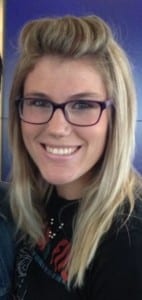Monday 21st November
Helen McCarron and Claire Butler
Today was the turn of Helen McCarron and Claire Butler to lead our guest lecture, which was focused towards Freelance and Self-employment.
Helen began the talk by informing us that according to the Creative Skill Set Website: 67% of audio, sound and music workers are freelance, while 30% of last year’s Audio Production graduates also went freelance. This highlighted the likelihood of freelance work, and how vital it is that I improve my knowledge into this career opportunity.
After this, Helen and Claire conducted a 10-question quiz to test our knowledge on everything freelance and self-employment-based. Questions varied from how many BECTU advise a sound freelancer working in film should be paid daily, to when and how many times a year tax is due, to what sort of expenses can be claimed back through business work. On the quiz I scored a mere 5/10, suggesting that I definitely need to enhance my knowledge! Claire took us through the answers at the end of the quiz and explained the questions in more detail.
Succeeding this, Helen gave us useful resources in similar areas, such as BECTU’s YouTube tutorial, “Accountancy Q+A”, while Claire lists the many pros and cons of freelance work. Interestingly, Helen and Claire suggested freelance work was a great opportunity to follow post-graduation, in order to build up experience and portfolio work before heading to an interview with a client. This way, you have more to offer the client as they can see the skills and experience you have earned. This directly challenges what Lucy Johnstone suggested in the first guest lecture, when she stated that starting lower down in a company could be a better way to go, in order to get your foot in the door, before working your way up the ladder in a company, which would in turn provide more experience and work for your portfolio. From this, I have taken the notion that it is possible to go either route I prefer, as they both have their pros and cons and have been argued as equal routes to take, it is more up to which way I would prefer to go.
Finally, Claire informed us about a £2 500 grant students can receive when graduating from university. The scheme was created in order to help fund start-up businesses in buying equipment, office space, etc… and is eligible to anyone on the Audio Production course, limited to 30 places. Students must undertake a series of masterclasses which Claire outlined. It is not essential to attend all, but it would be most useful. Then students must pitch their business ideas for why they believe they should be given the grant, and the panel will decide if one is successful or not.
I found this lecture incredibly useful, as demonstrated I do not have great knowledge in the area of freelance and self-employment. Even though it was only an introductory lecture to this topic, it was very informative and also detailed the many other student workshop masterclasses and resources we can go and find in order to enhance our knowledge. Freelance work is definitely a possibility I must consider as I am looking for location sound or post-production work, and this seems to be a very popular and successful route than many graduates and experts in the industry follow. For example, even though Lucy started at a company, she now does work freelance. This implies to me that within this industry there is a high possibility of working freelance at any time, whether that be at the start, in the middle, or at the end of your media career.
